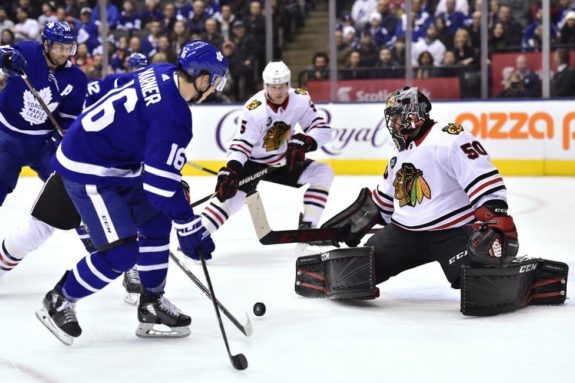A
I encourage Maple Leafs fans to listen to Dreger’s thoughtful comments. In them, he explains why he believes Marner’s people should have their client see what he’s worth to other teams. During his interview, Dreger explained how the RFA process worked and why hockey players only have a few times in their careers where they can maximize their earning potential.

Still, he didn’t say that Marner would actually throw out feelers to see what other teams might want to pony up. He simply doesn’t know.
How the RFA System Works
As Dreger noted, there’s an RFA system in place that can make life difficult for teams, fans, and even players. Teams must figure out how to invest the limited (in terms of the salary cap) funds they have to sign players. Who do they give up so they might invest in other players? In looking to the future, how can a team successfully envision where a player might be in a year or two?
Related: Canucks Should Offer Sheet Kapanen or Johnsson
Players must consider both
Because most great players treasure winning, they must consider that perhaps making less salary might allow them to succeed in other ways. A wise player would consider both his own salary and the salary structure of the entire team. Too much salary, even if you could get it, would likely cannibalize the team’s ability to sign other good players.
No player, think of Connor McDavid in Edmonton, can win the Stanley Cup by himself – and he has Leon Draisaitl as well. Great teams win Stanley Cups, not great players.
What Dreger Didn’t Say
If you listen to Dreger’s radio comments, he was outlining the system. He didn’t predict Marner would sign someplace other than in Toronto. Nor did he say that Maple Leafs general manager Kyle Dubas wouldn’t pitch something attractive to Marner’s agents. Dreger simply reviewed the process involved and suggested why this process made signing high-end players such as Marner so difficult.

The reaction to Dreger’s comments seemed over the top. Commentators suggested that the Maple Leafs contract negotiations with Marner would be contentious – William Nylander all over again. Dreger didn’t say that at all.
Commentators suggested that RFA Marner is “reportedly interested” in testing the market before inking a potential new deal with Toronto. Dreger didn’t say that either.
What Dreger did outline was what the RFA process allowed and why he believed it was a wise idea for Marner to engage that process. Still, that doesn’t mean it’s likely Marner would sign an offer sheet. In fact, during the discussion, Tampa Bay Lightning Steven Stamkos was noted to have tested the market and then resigned with his old team.
Even The Sporting News, whose writers mostly report rather than create the news, seemed to go a bit Chicken Little (“The Sky is Falling”). Although The Sporting News writer Rudi Schuller did a credible job of reporting exactly what Dreger said, he linked it to Nylander’s contract situation, which so far is inaccurate and which would create a spectacle no Maple Leafs fan would wish to revisit.
Related – Mason Marchment: A Long Shot Worth Rooting For
In fact, the panel’s discussion about Nylander noted that the fans supported him but then turned on him a month into the season when things didn’t go well. And there’s no way that history is lost on Marner or his agents. Marner wouldn’t risk “déjà vu all over again.”
Dreger didn’t say there was enmity between Marner’s agents and Dubas. Nor did he say that Marner “was thinking about” extending talks past July 1 or visiting other teams. In fact, because the negotiations are quietly happening, no one knows what Marner is thinking at all.
What Dreger Did Say
Dreger did outline the process for RFA negotiations. As an RFA, Marner can talk with other NHL teams during the last week of June. However, only the Maple Leafs would be able to sign him before July 1.
Related – NHL Rumors: Kings, Oilers, Maple Leafs, More
Dreger also noted that things were amicable between the team and Marner and that both sides have had exchanges, although he wasn’t “talking about contract offers or negotiations, just back and forths.” In fact, Dreger said he wouldn’t be “surprised if the agent, Darren Ferris, doesn’t connect with Kyle Dubas and the Leafs management crew in Buffalo this week during the [NHL Scouting] Combine.”

Dreger did note that he believes Marner will meet with other teams, if only because it’s “due process.” In fact, he noted that he would be “shocked” if the Marner team – including his Dad – were not on a plane asking what clubs might be willing to offer him as an offer sheet. However, Dreger believed that the Maple Leafs would offer something “aggressive” to Marner that was over $10 million per season. As Dreger notes, they should.
Why the Sky Is Not Falling
I have already weighed in on how I see the situation, thinking of it from a business perspective for both sides.
First, I don’t see an offer sheet over $11 million will be coming for Marner from any NHL team. An $11 million offer sheet isn’t good business. Successful businesses balance risk and reward, and here potential risk outweighs
Second, I believe the Maple Leafs hold an advantage. Obviously, to play that advantage Dubas must be a businessman who sees Marner as an asset and not the young player he nurtured through the organization.
Because Marner is an asset, Dubas must be willing to let Marner go if the cost is too high. And, if he’s thinking only of moving assets around, NHL teams who have the salary cap space to offer Marner $11 million would likely not be successful teams. And, because the least successful teams have higher draft picks every season, receiving four first-round draft picks for Marner might not be such a bad trade from a business perspective.
Related – 2019 NHL Combine: What to Watch For
Third, if you see Marner as an asset to leverage, losing an $11 million salary immediately helps minimize the Maple Leafs cap difficulties, which exist mainly because the team actually wants to sign Marner. If it didn’t want to sign him, there would be no salary cap issue. Four first-round draft picks over four years on entry-level contracts creates a huge relaxation on the team’s salary cap issue.

Fourth, I don’t believe (and I might be wrong) Marner wants to play anywhere else for two reasons. Reason one is about the money. Marner is the team’s top earner in off-ice income, and there’s off-ice income in Toronto for Maple Leafs players that can’t be had elsewhere.
Reason two, and here I veer off business. Marner is living a dream playing for his beloved Maple Leafs. Not only is he playing for his “home” team,
A Tempest in a Teapot
In short, I believe the reaction to Dreger’s commentary on TSN 1050 radio has been a tempest in a teapot. The sky is not falling in Toronto. One way or another, with or without Marner, the Maple Leafs will ice a good team next season.
I hope that’s with Marner, but he has to hope that, too.